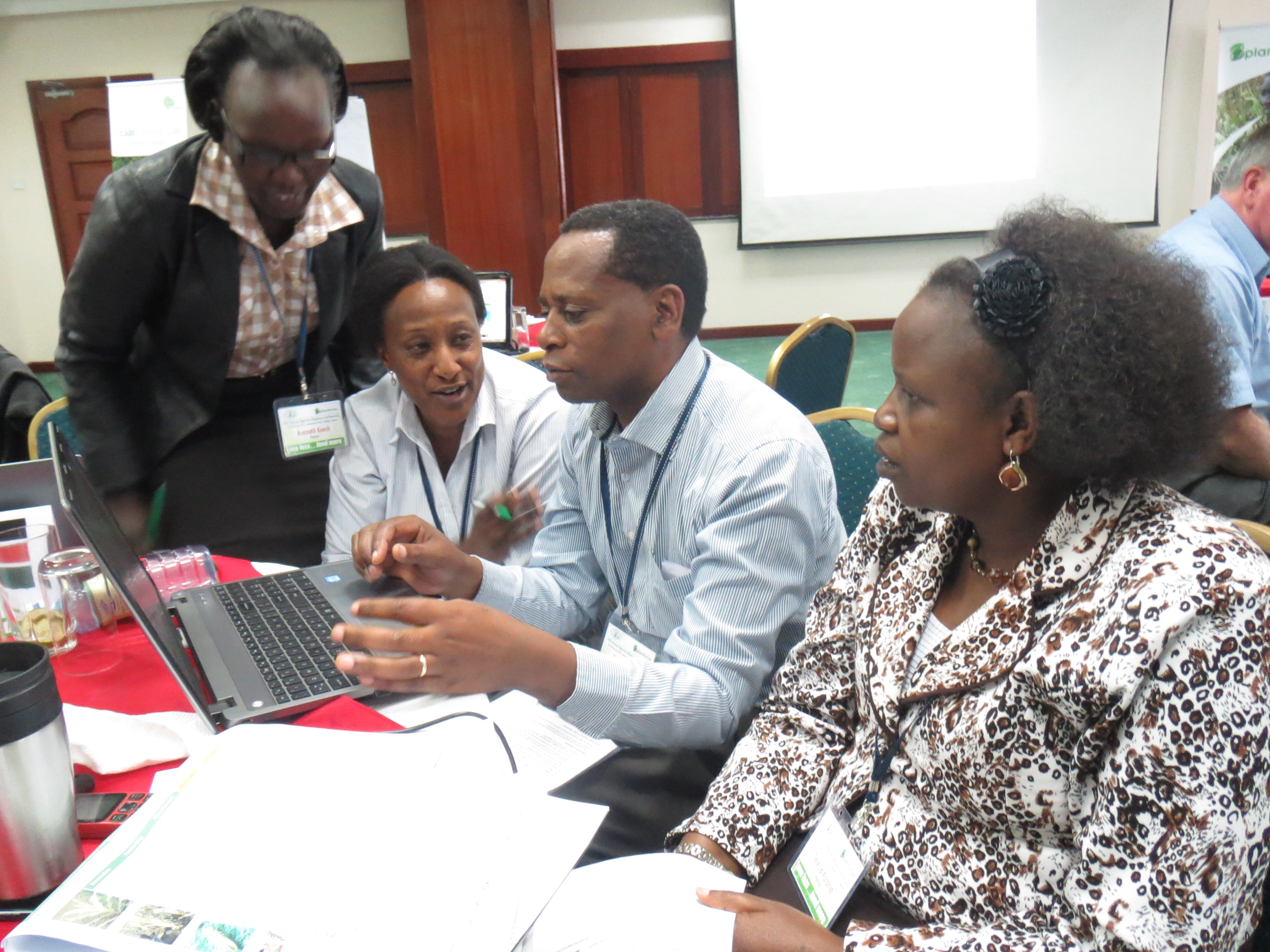From Rwanda, Uganda, Kenya and Tanzania, key representatives of agricultural institutions gathered in Nairobi last week for the first ever joint workshop led by CABI’s Plantwise programme and the International Plant Protection Convention (IPPC) Secretariat. The workshop was convened in an effort to exchange national experiences in plant protection and pave the way for renewed strategies to share plant pest information from the region.
The workshop highlighted the variety of actors already working in each country to detect, report and respond to pest problems, which on average account for 40% of crop losses worldwide and threaten trade and food security. However, across the region it was apparent that all national systems could benefit from additional resources and collaboration, especially for fulfilling national reporting obligations under the IPPC. Since 1951, the IPPC has been responsible for protecting agriculture and the environment by limiting the spread of plant pests. Essential to this mission is country-level cooperation among different organizations.
“Meeting food needs and becoming industrialized countries, we can do that before 2030,” says Dr Augusta Abate, FAO representative in Kenya, “but this requires reducing crop losses and working together to safeguard food security. These are some of the things we are discussing here today.”
Among the plant health resources available to help countries meet reporting obligations, inform national strategy, and ultimately help farmers in East Africa respond to emerging plant health problems, is the Plantwise programme. Now working with partners in over 30 countries worldwide, including the 4 countries present at the workshop, Plantwise helps implement front-line pest detection and national response through a network of local plant clinics, backed by a global plant health knowledge bank.
Country representatives during the 3-day workshop uncovered new ways to communicate the information generated from these plant clinics, as well as take advantage of resources like phytosanitary.info from IPPC, and pest alerts, mapping and pest management guides found in the Plantwise knowledge bank.
“This is the first time we’ve brought together NPPOs, extension, research and academic institutions, and it is not only to support phytosanitary efforts, but also to share information that will help countries become more proactive,” says David Nowell of the IPPC Secretariat. “Central to this will be the IPPC, the Plantwise programme and the FAO to help implement and provide recommendations.”
Participants discovered, for example, how data on crops and pests commonly brought into the clinics by farmers can sound an alert to their National Plant Protection Organizations (NPPOs) and IPPC contact points, who, together with other national organizations (extension, regulation and research bodies), can better report and react to pest situations.
“If we had known this sooner, we would have engaged more closely with policy makers to raise their awareness about pest threats. Now you are going to see more governments and more policy-makers also wanting to get engaged,” says James Wanjohi, Head of Extension Administration with the Ministry of Agriculture, Kenya.
Holding regular stakeholder forums, circulating regional pest news, and providing additional training on submitting official pest reports were just a few of the ideas which arose from collaborative discussions.
The next step will be to put in motion national action plans with their home institutions, and further tap into Plantwise resources as a means of greater participation in IPPC implementation.
“If you can understand the roles of the NPPO and IPPC, and how Plantwise complements these, then we can go back and start talking differently. We can work better together,” says Dr Konan Kouame, CPM Bureau Member from Côte D’Ivoire. “The problems we face are the same.” 
This workshop was held in the run-up to the 9th Session of the Commission on Phytosanitary Measures at FAO headquarters in Rome, where it is hoped that key messages from the East African workshop can inspire continued discussions on Plantwise and IPPC collaboration amongst actors in other regions. “It is good that the delegates of African countries can go to Rome and bring this experience and focus to the table – the message is that information is power, and this can reduce hunger and poverty,” says Plantwise Regional Coordinator for Africa Washington Otieno. “We are finding ways.”
Julia Dennis, Communications Manager, CABI Plantwise. email: j.dennis@cabi.org
About Plantwise
Plantwise is a global programme led by CABI to increase food security and improve livelihoods by reducing crop losses. For more information, visit www.plantwise.org
About IPPC
The International Plant Protection Convention (IPPC) is an international agreement on plant health to which 181 signatories currently adhere. It aims to protect cultivated and wild plants by preventing the introduction and spread of pests. The Secretariat of the IPPC is provided by the Food and Agriculture Organization of the United Nations.


